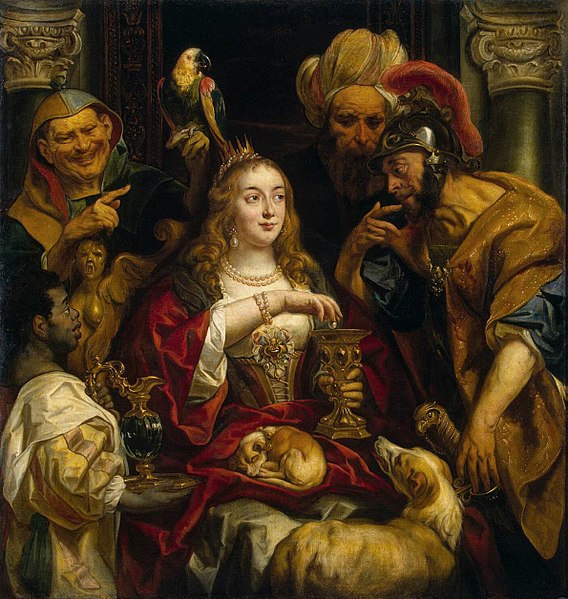|
Плиний Старший в "Естественной истории" (XXI.9) приводит короткий рассказ о том, как Клеопатра водрузила отравленный венок на голову Антония (некоторые считают, что правильный перевод: водрузила на свою голову) во время пира, а затем предложила ему выпить чашу с лепестками с этого отравленного венка, но в последний момент остановила его. Учитывая вскрытые ФиН евангельские события в биографиях Антония и Клеопатры (см. "Начало ордынской Руси"), возможно этот сюжет - отражение тернового венца Христа, а Клеопатра здесь - Иуды Искариота? А также сюжета "моления о чаше" ("пронеси чашу сию мимо Меня")?
http://www.perseus.tufts.edu/hopper/text?doc=Perseus%3Atext%3A1999.02.0137%3Abook%3D21%3Achapter%3D9 Pliny the Elder, The Natural History, BOOK XXI. AN ACCOUNT OF FLOWERS. AND THOSE USED FOR CHAPLETS MORE PARTICULARLY., CHAP. 9.—AUTHORS WHO HAVE WRITTEN ON FLOWERS. AN ANECDOTE RELATIVE TO QUEEN CLEOPATRA AND CHAPLETS.
Among the Greeks, the physicians Mnesitheus and Callimachus have written separate treatises on the subject of chaplets, making mention of such flowers as are injurious to the head.1 For, in fact, the health is here concerned to some extent, as it is at the moments of carousal and gaiety in particular that penetrating odours steal insidiously upon the brain—witness an instance in the wicked cunning displayed upon one occasion by Cleopatra.
At the time when preparations were making for the battle that was eventually fought at Actium, Antonius held the queen in such extreme distrust as to be in dread of her very attentions even, and would not so much as touch his food, unless another person had tasted it first. Upon this, the queen, it is said, wishing to amuse herself with his fears, had the extremities of the flowers in a chaplet dipped in poison, and then placed it upon her head.2 After a time, as the hilarity increased apace, she challenged Antonius to swallow the chaplets, mixed up with their drink. Who, under such circumstances as these, could have apprehended treachery? Accordingly, the leaves were stripped from off the chaplet, and thrown into the cup. Just as Antonius was on the very point of drinking, she arrested his arm with her hand.—"Behold, Marcus Antonius," said she, "the woman against whom you are so careful to take these new precautions of yours in employing your tasters! And would then, if I could exist without you, either means or opportunity of effecting my purpose be wanting to me?" Saying this, she ordered a man to be brought from prison, and made him drink off the potion; he did so, and fell dead3 upon the spot.
1 It is a well-known fact, as Fée remarks, that the smell of flowers is productive, in some persons, of head-ache, nausea, and vertigo. He states also that persons have been known to meet their death from sleeping all night in the midst of odoriferous flowers.
2 "Ipsaque capiti imposita." Holland and Ajasson render this as though Cleopatra placed the garland on Antony's head, and not her own. Littré agrees with the translation here adopted.
3 Fée remarks that we know of no poisons, hydrocyanic or prussic acid excepted, so instantaneous in their effects as this; and that it is very doubtful if they were acquainted with that poison.
В биографии Клеопатры есть также известный сюжет, привлекавший художников, когда она якобы выпила на пиру чашу с растворенной в уксусе или вине очень драгоценную жемчужину, снятую с уха, ценою в 10 млн. сестерциев, участвуя в пари с Антонием. Т.е. ей пришлось пить уксус - возможно это отражение питья уксуса с желчью, которое давали Христу? С другой стороны, нет ли в этом сюжете некоего иносказания? Гертруда (отражение Иродиады и Марии Богородицы, по ФиН) в финале "Гамлета" пьет отравленное вино с жемчужиной, брошенной в кубок королем Клавдием. Жена Торелло в конце новеллы X,9 Декамерона пьет кубок с брошенным туда кольцом Торелло. С жемчугом сравнивали Христа, раковину - с Богородицей:
//Тогда верили, что жемчужина зарождается в недрах раковины от удара молнии — небесного огня, сошедшего на море и на плоть раковины. Таким было, поучает тот же Ефрем Сирии, и чудесное зачатие Иисуса Христа в чреве Девы Марии.
http://ec-dejavu.ru/z/Zhemchug.html Жемчуг в природе и в культуре//
Плиний пишет, что у Клеопатры было две уникальнейших, самых больших в мире жемчужины, которые перешли ей по наследству от царей Востока. Одну она выпила, а вторую позднее доставили в Рим, разрезали на две части и приделали к изображению Венеры в Пантеоне (Зачем было разрезать уникальную большую жемчужину? Мотив разреза - не отражение ли кесарева сечения?):
Описание истории у Плиния (англ.) и Макробия (рус.):
http://www.perseus.tufts.edu/hopper/text?doc=Perseus%3Atext%3A1999.02.0137%3Abook%3D9%3Achapter%3D58 Pliny the Elder, The Natural History, BOOK IX. THE NATURAL HISTORY OF FISHES., CHAP. 58.—INSTANCES OF THE USE OF PEARLS
http://www.e-reading.bz/chapter.php/1002511/12/Makrobiy_-_Saturnalii.html Макробий. Сатурналии. Книга третья, 17. 14-17
Примерно в это же время, что и с Клеопатрой, в Риме имел место аналогичный случай: Клодий Эзоп, сын известного трагического актера Клодия Эзопа, у которого брал уроки декламации Цицерон, растворил в уксусе и выпил жемчужину Цецилии Метеллы. Об этом упоминает Гораций:
http://lib.ru/POEEAST/GORACIJ/hor1_4.txt Гораций. Сатиры, II.3.239ff
..Сын Эзопа жемчужину, бывшую в ухе Метеллы,
В уксусе крепком велел распустить, чтобы разом сестерций
Проглотить миллион: не умнее, чем в воду закинуть!..
Плиний о Клодии Эзопе:
http://www.perseus.tufts.edu/hopper/text?doc=Perseus%3Atext%3A1999.02.0137%3Abook%3D9%3Achapter%3D59 CHAP. 59.—HOW PEARLS FIRST CAME INTO USE AT ROME.
http://en.wikipedia.org/wiki/Clodius_Aesopus
Цецилия Метелла - жена одного из убийц Цезаря и возможно дочь скандальной Клодии Пульхры Терции, сестры Клодия. Клодий - отражение Иоанна Крестителя, см. "Начало ордынской Руси".
http://ru.wikipedia.org/wiki/Цецилия_Метелла_Целера
Также Светоний пишет про Калигулу, что он, купаясь в роскоши, пил драгоценные жемчужины, растворенные в уксусе.

Якоб Йорданс. Пир Клеопатры. 1653. Эрмитаж
|
